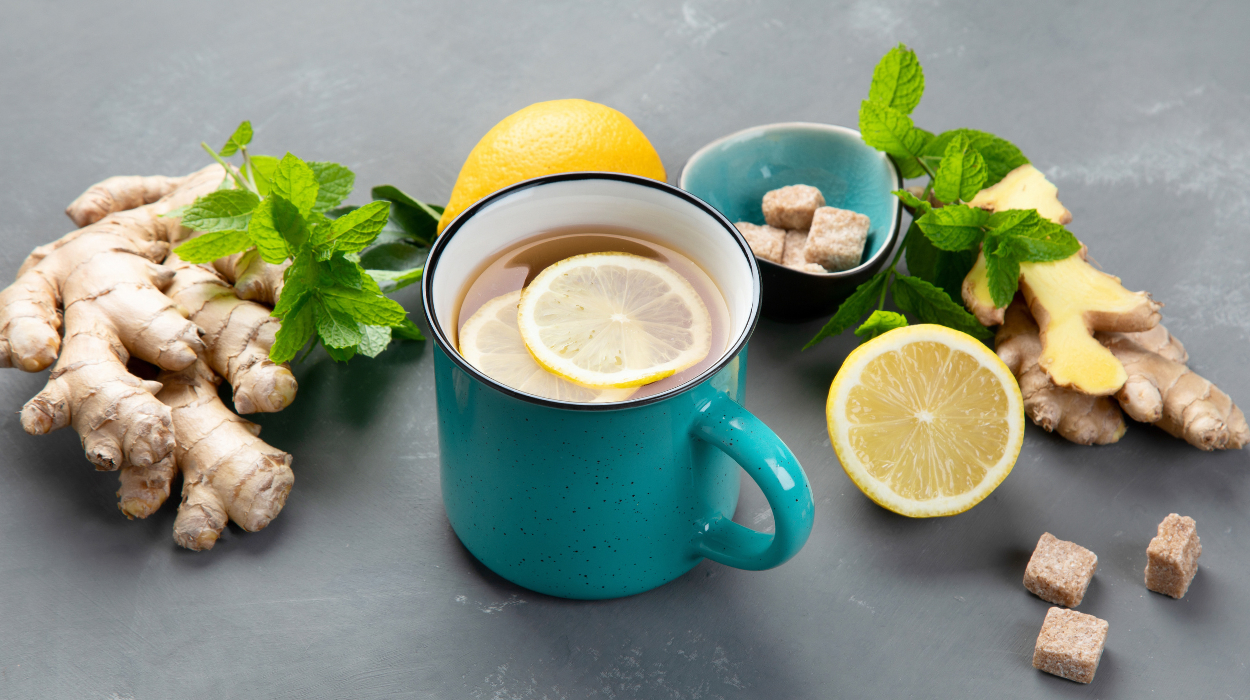Teas For Diabetes: Types, Benefits & Management Tips In 2024

In a world where diabetes management is crucial, the quest for natural remedies and healthier choices leads us to the realm of teas. Sipping on a warm cup of tea not only satisfies our taste buds but also holds the potential to support our journey toward balanced blood sugar levels.
Join us as we dive into the fascinating world of teas for diabetes, uncovering their hidden benefits, exploring a myriad of tea varieties, and uncovering ways to seamlessly incorporate them into your daily routine.
Whether you are a tea enthusiast or just looking for alternative beverage options, this article will guide you on the journey of discovering teas that can support your diabetes management goals.
5 Best Teas For People With Diabetes To Try
Tea can be a delightful and refreshing beverage for people with diabetes. Not only do certain teas offer a soothing and comforting experience, but they may also provide potential health benefits.
Here are five recommended teas for people with diabetes to consider incorporating into their routine:
- Green tea.
- Chamomile tea.
- Hibiscus tea.
- Cinnamon tea.
- Ginger tea.
Are Teas Good For Diabetes?
Yes. Teas have shown promise in benefiting individuals with diabetes by potentially helping with blood sugar control, insulin resistance, and overall health. This is also exemplified in research, which shows that at least 4 cups of tea per day[1] may lower the risk of type 2 diabetes.
Green tea, chamomile tea, hibiscus tea, cinnamon tea, and ginger tea are among the varieties studied for their potential positive effects. These teas are often low in calories and carbohydrates, making them suitable choices for managing blood sugar levels.[2]
Additionally, they offer potential antioxidant properties necessary for optimal health and to reduce the risk of cardiovascular disease. It is key to note that while teas can contribute to a diabetes-friendly diet, one must also monitor carbohydrate intake and consult with a healthcare professional, such as a registered dietitian, for personalized guidance.
Benefits Of Teas For Diabetes
Teas can benefit individuals with diabetes, offering various advantages to support their health. Let’s explore the benefits of drinking tea for diabetes and how they can help regulate blood glucose levels:
Antioxidant Power
Teas such as green tea, black tea, and herbal tea are high in antioxidants like polyphenols.[3] These antioxidants protect cells from free radicals and oxidative stress, reducing inflammation and the risk of chronic diseases associated with diabetes.
Hydration Support
Staying adequately hydrated is important for everyone, including individuals with diabetes. Unsweetened teas, which are mostly water-based and devoid of added sugars, can be a refreshing choice for maintaining hydration and supporting overall bodily functions.
Weight Management Aid
Drinking green tea has been studied for its potential to assist in weight loss and management. It’s catechins and caffeine content can boost metabolism and increase fat oxidation. Incorporating green tea into a healthy diet and active lifestyle may enhance the weight management efforts of people with diabetes.
And, if weight management is your goal and you are not getting enough protein in your diet, consider adding a protein supplement to your meal plan.
Enjoyable Variety
Teas come in a wide array of flavors and aromas, offering a pleasurable beverage experience. Exploring different types of teas, such as herbal infusions, green tea blends, or fruity teas, can add variety to a diabetes-friendly meal plan.
In addition to incorporating teas, individuals with diabetes can also consider including nutrient-rich superfoods into their diet. These superfoods are packed with essential vitamins and proteins that can further support their overall health and well-being.
5 Healthy Teas For People With Diabetes
Here are some popular types of tea for people with diabetes and what they have to offer.
Green Tea

This common beverage offers a host of potential health benefits.[4] It is rich in antioxidants,[5] particularly catechins, and has garnered interest from researchers worldwide. Emerging evidence suggests that this brew may support brain health, aid in weight management, and contribute to overall well-being, particularly for individuals with diabetes.[6]
Chamomile Tea

This soothing herbal infusion obtained from delicate chamomile blossoms promotes a sense of calmness and tranquility. Its relaxation properties[7] can help create a peaceful environment conducive to restful sleep.[8]
Chamomile tea[9] has also been linked to lower systolic blood pressure and as a treatment to reduce blood sugar levels making this tea beneficial for individuals with diabetes who may also have hypertension.
Hibiscus Tea

This tea, from the petals of the hibiscus flower, offers a visually striking and flavorful experience. Hibiscus tea is high in antioxidants, especially anthocyanins,[10] which support blood pressure management[11] with lifestyle modifications. Drinking hibiscus tea will also help combat oxidative stress and promote a healthy heart.
Cinnamon Tea

This is a fragrant and comforting brew made from the bark of the cinnamon tree and adds warmth and spice to the tea repertoire. Cinnamon tea has potential benefits for[12] improving fasting blood sugar levels and insulin signaling.
Ginger Tea

Ginger tea is derived from the roots of the ginger plant and offers a zesty and invigorating experience. Ginger has a long history of traditional use for its potential healing properties, particularly for nausea and vomiting[13] during pregnancy and also for high blood pressure and overall heart health.[14]
Sides Effects, And Safety
Tea is enjoyed by many people worldwide[15] and is known for its diverse flavors and potential health benefits. Still, it is also important to be aware of certain considerations and potential risks associated with tea consumption.
This list provides information on certain side effects of tea:
Allergies
While allergies to teas are relatively rare, some individuals may be allergic to specific types of tea or herbal ingredients. For example, those with a known allergy to ragweed[16] may experience allergies[17] when consuming chamomile tea.
After consuming tea, you must pay attention to any symptoms like itching, hives, or difficulty breathing and seek medical attention if needed.
Caffeine Sensitivity
Teas containing caffeine, such as green tea, black tea, and oolong tea, can affect individuals sensitive to caffeine. Caffeine can stimulate the central nervous system and may lead to symptoms like increased heart rate, restlessness, anxiety, or difficulty sleeping.
Suppose you have a known sensitivity to caffeine or underlying health conditions like anxiety or high blood pressure. In that case, choosing caffeine-free or low-caffeine tea options like decaffeinated versions is advisable.
Interactions With Medications
Herbal teas, for example, may interact with certain medications, potentially affecting their effectiveness or causing adverse effects. Herbal teas[18] like chamomile, ginger, or ginkgo biloba can interact with blood-thinning medications, blood pressure medications, or sedatives, although a general lack of data on these interactions is available.
Digestive Issues
Certain teas can have varying effects on the digestive system. For example, herbal teas with laxative properties like senna or cascara sagrada can cause gastrointestinal discomfort,[19] including bloating, gas, or diarrhea, especially when consumed excessively or for extended periods.
Pregnancy And Breastfeeding
Some herbal teas, such as licorice root, ginger, chamomile, sage, peppermint, green tea, or certain types of mint, may contain ingredients not recommended[20] during pregnancy and breastfeeding, as they may have potential effects on pregnancy or breastfeeding outcomes.
Quality And Source
Ensuring the quality and source of teas is essential for safety. Choosing high-quality teas from reputable brands or trusted sources helps minimize the risk of contamination, such as with pesticides or heavy metals. Opting for organic teas can also be a good choice, as they are produced without synthetic pesticides or fertilizers.
Conclusion
Incorporating tea into a diabetes management plan can offer a range of potential benefits. Teas like green tea, chamomile tea, hibiscus tea, cinnamon tea, and ginger tea have shown promise in supporting blood sugar control and overall health.
This range of teas has shown potential effects on blood sugar management, antioxidant power, hydration support, and weight management. It’s important to remember that individual needs may vary, and consulting healthcare professionals for personalized advice or supplements is recommended.
Frequently Asked Questions
Certain types of tea, such as green tea and cinnamon tea, contain compounds that may help regulate blood sugar levels.
Yes, individuals with diabetes can typically enjoy tea as part of a balanced diet.
Tea, particularly green tea, black tea, and herbal teas, can offer potential health benefits such as antioxidant power, hydration support, help with weight management, and variety in flavors and aromas
No, tea cannot cure diabetes. It can be a supportive component of a diabetes management plan but should not replace medical treatment.
Both hot and cold tea can be enjoyed by individuals with diabetes. Choose unsweetened options and consider personal preferences and weather conditions.
There is no specific recommendation for the amount of tea to drink per day for individuals with diabetes.
+ 20 sources
Health Canal avoids using tertiary references. We have strict sourcing guidelines and rely on peer-reviewed studies, academic researches from medical associations and institutions. To ensure the accuracy of articles in Health Canal, you can read more about the editorial process here
- Jing, Y., Han, G., Yun Hang Hu, Bi, Y., Li, L. and Zhu, D. (2009). Tea Consumption and Risk of Type 2 Diabetes: A Meta-Analysis of Cohort Studies. [online] 24(5), pp.557–562. doi:https://doi.org/10.1007/s11606-009-0929-5.
- Meng, J.-M., Cao, S.-Y., Wei, X., Gan, R.-Y., Wang, Y., Cai, S., Xu, X.-Y., Marriott, P.J. and Li, H. (2019). Effects and Mechanisms of Tea for the Prevention and Management of Diabetes Mellitus and Diabetic Complications: An Updated Review. [online] 8(6), pp.170–170. doi:https://doi.org/10.3390/antiox8060170.
- Khan, N. and Mukhtar, H. (2018). Tea Polyphenols in Promotion of Human Health. [online] 11(1), pp.39–39. doi:https://doi.org/10.3390/nu11010039.
- Musial, C., Alicja Kuban-Jankowska and Gorska-Ponikowska, M. (2020). Beneficial Properties of Green Tea Catechins. [online] 21(5), pp.1744–1744. doi:https://doi.org/10.3390/ijms21051744.
- Chacko, S.M., Thambi, P.T., Kuttan, R. and Nishigaki, I. (2010). Beneficial Effects of Green tea: a Literature Review. Chinese Medicine, [online] 5(1), p.13. doi:https://doi.org/10.1186/1749-8546-5-13.
- Jae Yong Park, Bae, J.-H., Sung Gap Im and Song, D.-K. (2014). Green tea and type 2 diabetes. [online] 3(1), pp.4–10. doi:https://doi.org/10.1016/j.imr.2013.12.002.
- Sah, A., Punnoth Poonkuzhi Naseef, Mohamed Saheer Kuruniyan, Jain, G.K., Foziyah Zakir and Aggarwal, G. (2022). A Comprehensive Study of Therapeutic Applications of Chamomile. [online] 15(10), pp.1284–1284. doi:https://doi.org/10.3390/ph15101284.
- Dai, Y.-L., Li, Y., Wang, Q., Niu, F.-J., Li, K.-W., Wang, Y.-Y., Wang, J., Zhou, C.-Z. and Gao, L.-N. (2022). Chamomile: A Review of Its Traditional Uses, Chemical Constituents, Pharmacological Activities and Quality Control Studies. [online] 28(1), pp.133–133. doi:https://doi.org/10.3390/molecules28010133.
- Khan (2014). Chamomile tea: herbal hypoglycemic alternative for conventional medicine. Pakistan journal of pharmaceutical sciences, [online] 27(5 Spec no). Available at: https://pubmed.ncbi.nlm.nih.gov/25176245/
- María Elena Soto, Zuñiga-Muñoz, A., Verónica Guarner Lans, Erendira Janet Duran-Hernández and Pérez-Torres, I. (2016). Infusion ofHibiscus sabdariffa L.Modulates Oxidative Stress in Patients with Marfan Syndrome. [online] 2016, pp.1–12. doi:https://doi.org/10.1155/2016/8625203.
- Majid Jalalyazdi, Ramezani, J., Azadeh Izadi-Moud, Fereshteh Madani-Sani, Shirin Shahlaei and Shirin Sadat Ghiasi (2019). Effect of hibiscus sabdariffa on blood pressure in patients with stage 1 hypertension. [online] 10(3), pp.107–107. doi:https://doi.org/10.4103/japtr.japtr_402_18.
- Maria Ester Bernardo, Maria Manuela Silva, Conceição, E., Moncada, M.C., José Carlos Brito, Luís Proença, Singh, J. and Jose, M. (2015). Effect of Cinnamon Tea on Postprandial Glucose Concentration. [online] 2015, pp.1–6. doi:https://doi.org/10.1155/2015/913651.
- Lete, I. and José Allué (2016). The Effectiveness of Ginger in the Prevention of Nausea and Vomiting during Pregnancy and Chemotherapy. [online] 11, pp.IMI.S36273–IMI.S36273. doi:https://doi.org/10.4137/imi.s36273.
- Wang, Y., Yu, H., Zhang, X., Feng, Q., Guo, X., Li, S., Li, R., Chu, D. and Ma, Y. (2017). Evaluation of daily ginger consumption for the prevention of chronic diseases in adults: A cross-sectional study. [online] 36, pp.79–84. doi:https://doi.org/10.1016/j.nut.2016.05.009.
- Khan, N. and Mukhtar, H. (2013). Tea and Health: Studies in Humans. [online] 19(34), pp.6141–6147. doi:https://doi.org/10.2174/1381612811319340008.
- Zadeh, J., Kor, N. and Kor, Z. (2014). Corresponding Author Chamomile (Matricaria recutita) As a Valuable Medicinal Plant. International journal of Advanced Biological and Biomedical Research, [online] 2(3), pp.823–829. Available at: https://odontoanamaria.com/artigos/camomila06.pdf
- Denisow-Pietrzyk, M., Pietrzyk, Ł. and Bożena Denisow (2019). Asteraceae species as potential environmental factors of allergy. [online] 26(7), pp.6290–6300. doi:https://doi.org/10.1007/s11356-019-04146-w.
- Gupta, R.C., Dennis Hsu-Tung Chang, Srinivas Nammi, Bensoussan, A., Bilinski, K. and Roufogalis, B.D. (2017). Interactions between antidiabetic drugs and herbs: an overview of mechanisms of action and clinical implications. [online] 9(1). doi:https://doi.org/10.1186/s13098-017-0254-9.
- Nih.gov. (2020). Senna. [online] Available at: https://www.ncbi.nlm.nih.gov/books/NBK547922/
- Lisha Jenny John and Shantakumari, N. (2015). Herbal Medicines Use During Pregnancy: A Review from the Middle East. [online] 30(4), pp.229–236. doi:https://doi.org/10.5001/omj.2015.48.



